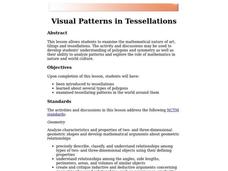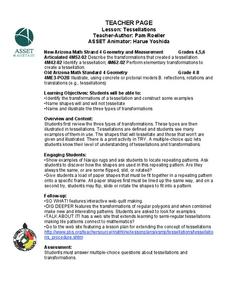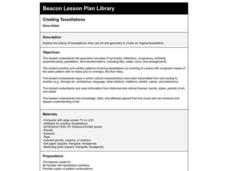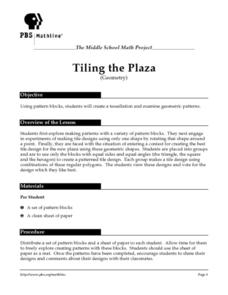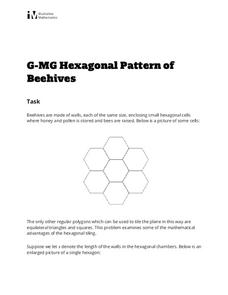Curated OER
Tessellations
Young scholars create tessellations. In this geometry lesson, students use polygons to create different patterns by rotation. They identify the reasons for polygons to create the type of tessellation it does.
Curated OER
Visual Patterns in Tessellations
Learners explore tessellations as well as various types of polygon. Students examine tessellating patterns in the world around them. Learners examine tessellations by creating their own tessellations and completing the included worksheet.
Curated OER
Tessellations & Transformations
In this tessellations and transformations worksheet, 10th graders solve 9 different problems that include various types of tessellations. First, they write examples from history of tessellations and name 3 artists. Then, students define...
Curated OER
Tiling the Plane
Fifth graders use pattern blocks and triagular grid paper to reivew shape names, be introduced to the concept of a tiling of the plane, and determine which pattern blocks tile the plane. They are asked if they comprehend what a...
Curated OER
Tessellations
In this tessellations instructional activity, 10th graders solve 6 different types of tessellation problems that includes drawing. First, they define polygon, regular polygon, tessellation, regular tessellation, and semi-regular...
Curated OER
Tessellation
Young scholars create an art piece incorporating tessellating shapes, translational symmetry, reflectional symmetry,and or rotational symmetry. They are asked if they know the definition of tessellation. If so, students are asked what...
Curated OER
Tessellations
Learners form repeating patterns using tessellations. In this tessellations lesson, students identify shapes and illustrate three types of transformations. A website is included with the lesson which provides extension activities and...
Curated OER
Creating Tessellations
Third graders explore the history of tessellations; then use art and geometry to create an original tessellation.
Curated OER
Terrific Tessellations
Students explore tessellations that are found in nature and everyday objects. They observe the works of M.C. Escher. Students create their own tessellations using pencil and paper.
Curated OER
Tiling with Pentominoes
For this tiling with pentominoes worksheet, 10th graders solve 3 different problems related to tiling with pentominoes. First, they define pentomino as a type of polygon and locate 10 other pentomino shapes in the figure shown at the...
New York City Department of Education
Chris’ Garden Dilemma
Make the connections between area, tiling, and multiplication. A performance task and associated unit presents the concept of area and makes the connection to multiplication. Pupils work through three major sections of instruction that...
Curated OER
Space Tiling with Captain Planet
Fifth graders Apply the symmetry and angle properties of polygons, using symmetry and angle properties of polygons to solve practical problems. They study tessellates and explain why a shape tessellates.
Curated OER
Tiling the Plaza (Geometry)
Middle schoolers make patterns with a variety of pattern blocks. Pupils experiment with making tile designs using only one shape by rotating that shape around a point. They enter a contest for creating the best tile design for the new...
Curated OER
Tessellation Lesson Plans
Students in second through eighth grades can fill their imaginations with repeating shapes!
Curated OER
Tessellmaniacs
Seventh graders create 3 original tessellation using polygons. They slide, turn, rotate and glide their designs on the computer. They print their tessellation on a T-shirt and teach the 6th graders about tessellations.
Illustrative Mathematics
Hexagonal Pattern of Beehives
Young geometers and biologists investigate the math of nature in an activity that is just the bee's knees. Participants will study the tessellations of hexagons in a beehive, along with the natural rationale behind the specific shape....
Texteam Geometry Institute
Geometry for the High School Classroom
What does it mean for apples to have chirality? This and other explorations in geometry, such as tiling the plane, boxing a tetrahedron, and investigating Euclid's Characteristic, are included in this resource on Euclidean geometry....
Curated OER
Terrific Tessellations
Students create, transform, and critique their own piece of artwork. In doing this lesson, students get more experience working with angles, lines, and measurement. They gain experience seeing, and creating their own patterns and shapes.
Curated OER
Tantalizing Tessellations - Lesson I
Middle schoolers complete a chart (KWL) as a pre-assessment, study the history of tessellations (tilings), investigate the properties of tessellations, and make and evaluate photographs of "found tessellations" for a...
Curated OER
Back to the Bees (Tesselations)
Sixth graders observe the creation of a tessellation with hexagons. In groups, they work with polygons to discover what shapes can be used to create tessellations and explore the angle measurements of each shape. Using internet websites,...
Curated OER
Tessellating the Hexagon
In this tessellating a hexagon worksheet, 10th graders complete 2 activities in creating a tessellation of a hexagon. They start off with the tessellation by the smallest pattern block and obtain other tessellations by replacing each two...
Curated OER
Symmetry and Tessellations
Sixth graders investigate tessellations and their origins. Students trace triangles to form a tessellation. They measure the angle of equilateral triangles. Students locate the line of symmetry, they create geometric squares,...
PBS
Frame Yourself: Area and Perimeter
Elementary schoolers are arranged in pairs and view the video Math Works: Measurement: The Difference Between Perimeter and Area. They discuss any prior knowledge they have of the term perimeter and then brainstorm together what the...
Curated OER
Keeping in Shape
Third graders describe patterns in terms of reflection and rotation symmetry, and translations. They design and make a pattern which involves translation, reflection, or rotation. They demonstrate why a given tessellation covers the...



